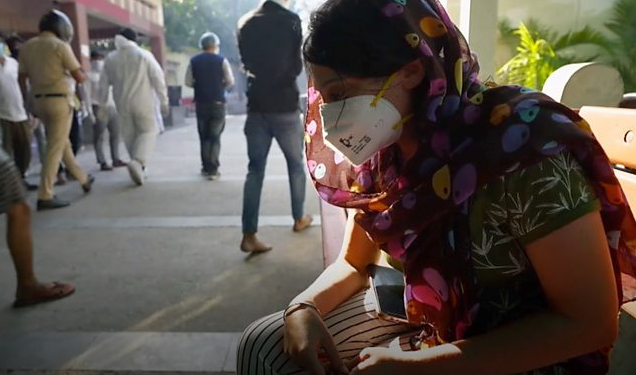Most hospitals in Delhi and many other cities in India have completely run out of beds, forcing people to find ways to get treatment for sick patients at home. But even that is proving to be a difficult task as prices of oxygen cylinders, concentrators and essential medicines have skyrocketed on the black market.
Anshu Priya spent most of her Sunday looking for an oxygen cylinder as her father-in-law’s condition continued to deteriorate. She couldn’t find any hospital bed in Delhi or in its suburb of Noida. Her search for an oxygen cylinder in shops was also futile, forcing her to turn to the black market.
She paid the hefty amount of 50,000 rupees ($670; £480) to procure a cylinder from the black market. It costs 6,000 rupees in normal times.
Her mother-in-law is also struggling to breathe and Anshu is now worried about her. She says she may not be able to afford another cylinder on the black market.
- Countries send urgent aid to Covid-stricken India
- Patients die without oxygen amid Delhi Covid surge
- Why India is running out of oxygen again
- How have you been affected by coronavirus in India? Email:haveyoursay@bbc.co.uk.
The BBC also called several oxygen cylinder suppliers and most of them asked for at least 10 times more than the normal price.
Her struggle is not unique. Hospitals in many cities, including Delhi, Noida, Lucknow, Allahabad and Indore, have run out of beds, leaving families to rely on makeshift arrangements at home.
The situation is particularly dire in Delhi where there are no ICU beds left. Families, those who can afford it, are hiring nurses and remote consulting a doctor to keep their loved ones breathing.
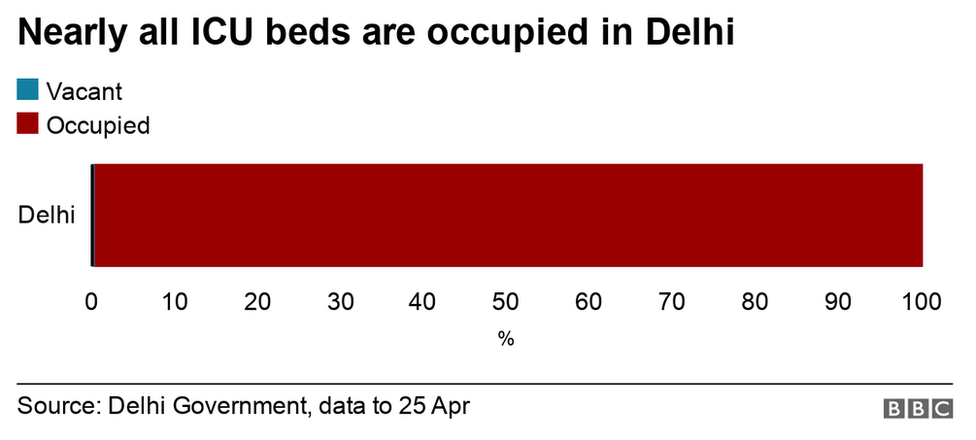
India has been reporting more than 300,000 cases for days, setting new daily global records. On Monday, it had the highest number of daily coronavirus cases for a fifth straight day, reporting 352,991 new infections and another 2,812 deaths in the previous 24-hour period.
This sharp spike has overwhelmed the healthcare system of many cities, and left no choice for families but to arrange whatever they can at home for their sick loved ones. But the struggles are huge from getting blood tests done to getting a CT scan or x-ray.
Labs are overrun and it’s taking up to three days for test results to come back. This is making it harder for treating doctors to assess the progression of the disease. CT scans are also used by doctors to asses the condition of the patient but it’s taking days to get an appointment.
Doctors say that these delays are putting many patients at risk. RT-PCR tests are also taking days. I know several sick patients who found a bed but couldn’t get admitted as they didn’t have a positive Covid report.
Back to getting treatment at home, Anuj Tiwari hired a nurse to assist in the treatment of his brother at home after he was refused admission in many hospitals.
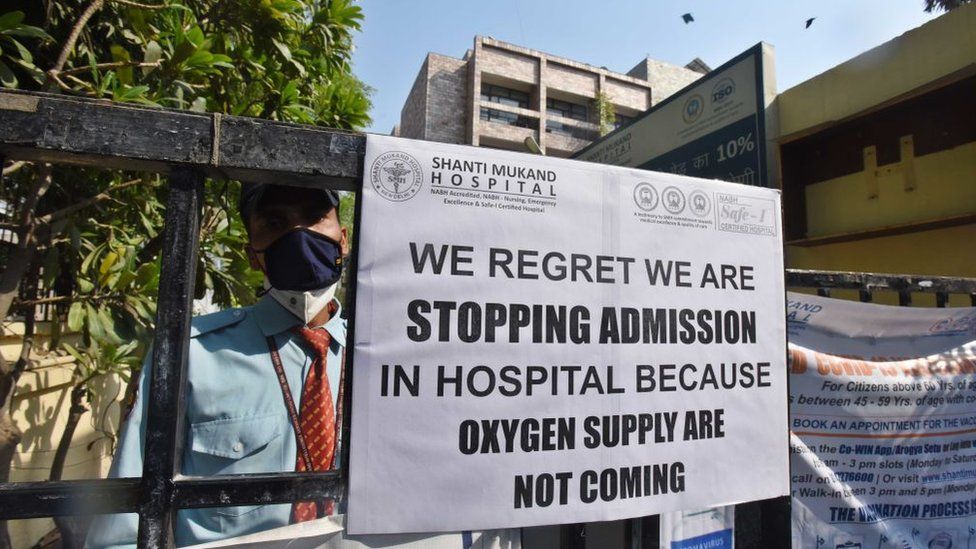
Some said they didn’t have any free beds and others said they were not taking new patients due to continuing uncertainty over the supply of oxygen. A number of patients have died in Delhi due to a lack of oxygen supply. The city’s hospitals are desperate and some have been issuing daily warnings, saying they are left with just a few hours of oxygen. Then the government swings into action and tankers are sent, which is often enough to run the hospital for a day.
A doctor in Delhi said that was how hospitals were working and “there are real fears now that a big tragedy may happen”.
Given the scenario at hospitals, Mr Tiwari paid a hefty amount to procure a concentrator – which can extract oxygen from the air – keep his brother breathing. The doctor also asked him to arrange the anti-viral drug remdesivir, which has been given emergency-use approval in India and is being prescribed widely by doctors. The benefits of the drug – which was originally developed to treat Ebola – are still being debated across the world.
Mr Tiwari couldn’t find the drug in any medicine shop and eventually turned to the black market. His brother’s condition continues to be critical and the treating doctor says he may soon need a hospital where remdesvir could be administered.
“There are no beds. What will I do? I can’t even take him anywhere else as I have already spent so much money and don’t have much left,” he said.
He added that “the desperate battle to save Covid patients has shifted from hospitals to home”, and even that is proving to be a daunting task as “we don’t have easy access to oxygen”.
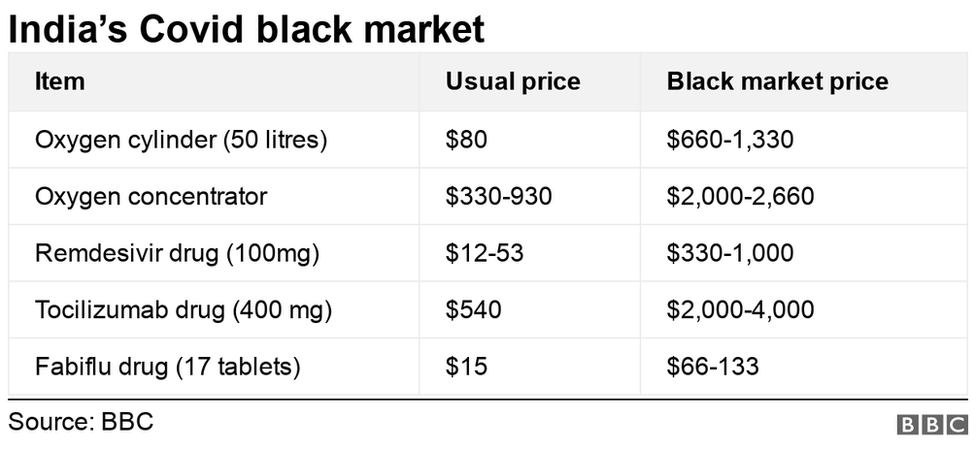
Remdesivir is in such short supply that families of the patients who are being treated at home are rushing to procure it. They want to have the drug in case the patient is required to go to hospital and may need the drug.
The BBC spoke to several dealers on the black market who said the supply was tight and that was why they were charging such high prices. The government has allowed seven firms to manufacture remdesvir in India and they have been told to ramp up production.
But several promises of adequate supply from the government have failed to show any result on the ground. Epidemiologist Dr Lalit Kant says the decision to ramp up production was taken too late and the government should have been prepared for the second wave.
“But somehow the drug is available in the black market, so there is some leakage in the supply system which the regulators haven’t been able to plug,” he says.
“We learnt nothing from the first wave.”
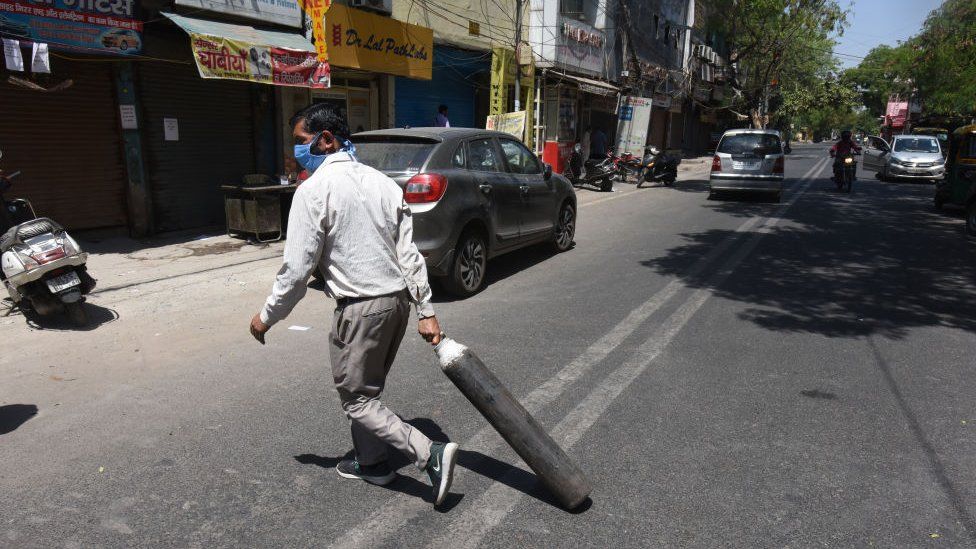
Another drug that is in huge demand is tocilizumab. It is normally used to treat arthritis but studies have shown that it can reduce the chances of a very sick patient needing to go on a ventilator.
Doctors are prescribing the drug mostly to patients who are severely sick. But it has disappeared from the market. Cipla, the Indian company that imports and sells the drug, has been struggling to meet the rising demand.
It usually costs around 32,480 rupees for a vial of 400mg. But Kamal Kumar paid 250,000 rupees to buy one dose for his father. He said the price was “mind boggling” but he had no other option but to pay.
But not many in India can afford to pay the price and they are being exploited in their desperation to save their loved ones. Public health expert Anant Bhan says the government should have procured the drug in huge quantities.
“Not many can afford to pay the official price of the drug, forget about the black market prices. This shows that there was no planning. The government failed to anticipate the wave and plan for it,” he says.
“People have been left to their own fate.”
Cheating
Fake remdesivir has also appeared in the black market. When the BBC questioned a dealer that the drug he was offering seemed fake as the firm manufacturing it wasn’t on the list of the companies licensed to produce it in India, he replied that it was “100% original”.
The packaging was also full of spelling errors. But he shrugged and asked me to get it tested in any laboratory. The firm also has no presence on the internet.
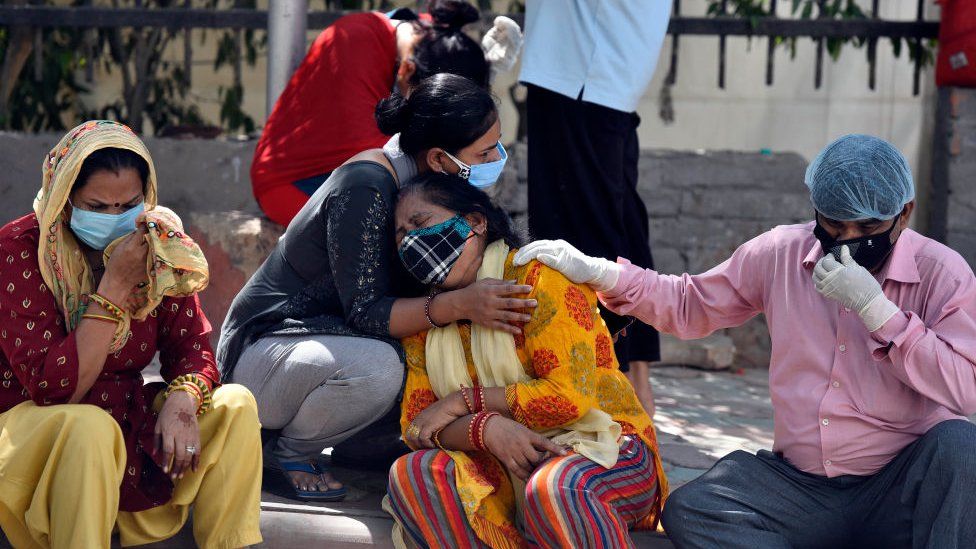
But such is the desperation that people are willing to buy even questionable drugs. And some have been cheated as well. People are constantly sharing phone numbers of suppliers who can provide anything from oxygen to medicines. But not all of these numbers are verified.
An IT worker, who did not want to be named, said that he desperately needed to buy an oxygen cylinder and remdesivir, and he got a lead from Twitter. When he contacted the person, he was told to deposit 10,000 rupees as advance payment.
“The moment I sent the money, the person blocked my number,” he said.
Desperation is driving people to trust anything in the hour of need and that seems to be fuelling the black market. Several state governments have promised to crack down on black marketing of remdesivir and some arrests have also been made. But the black market seems unfazed.
Mr Tiwari says people like him don’t have any choice but to pay more.
“It seems you can’t get treated in hospitals, and now you can’t save your loved ones even at home.”

